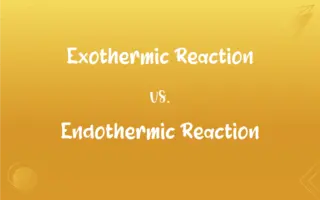Complementation vs. Recombination: What's the Difference?
Edited by Aimie Carlson || By Janet White || Published on February 29, 2024
Complementation is when two mutations in different genes restore a wild-type phenotype, while recombination is the exchange of genetic material between DNA molecules.

Key Differences
Complementation occurs when two different genetic mutations complement each other, resulting in a normal phenotype despite each mutation causing a defect. Recombination, however, is a genetic process where DNA molecules exchange genetic material, leading to genetic diversity.
Complementation typically involves two different genes within the same organism, helping to understand gene function and interaction. Recombination often occurs during meiosis, leading to shuffled alleles and increased genetic variation in offspring.
Complementation tests are used to determine if two mutations are in the same or different genes. Recombination is crucial in genetic mapping, allowing scientists to determine the locations of genes on chromosomes.
Complementation is observed when studying mutations and genetic disorders. Recombination is a regular occurrence in sexually reproducing organisms, contributing to the genetic uniqueness of each individual.
Complementation can provide insight into gene function and genetic pathways. Recombination is a driving force in evolution, introducing new gene combinations into populations.
ADVERTISEMENT
Comparison Chart
Definition
Two mutations restoring normal function
Exchange of genetic material
Mechanism
Interaction between different genes
Crossing over of DNA segments
Genetic Impact
Reveals gene function and interaction
Increases genetic diversity
Application
Used in genetic testing and research
Essential in genetic mapping and evolution
Complementation and Recombination Definitions
Complementation
A tool to determine if mutations are in the same gene.
Geneticists used complementation to map mutations in fruit flies.
ADVERTISEMENT
Recombination
Genetic exchange between different DNA molecules.
Genetic recombination during meiosis creates diverse offspring.
Complementation
Interaction between non-allelic genes to produce wild-type.
Complementation revealed the complexity of eye color genetics.
Recombination
A process contributing to genetic variability in populations.
Recombination is key in understanding genetic diversity in humans.
Complementation
A process indicating two mutations affect different genes.
Complementation tests showed the two defects were on different genes.
Recombination
Crossing over of chromosomes during gamete formation.
Recombination ensures no two gametes are genetically identical.
Complementation
Restoration of normal function by two different mutations.
In complementation studies, two recessive mutations resulted in a wild-type phenotype.
Recombination
A mechanism to shuffle alleles during sexual reproduction.
Recombination in plants leads to varied crop traits.
Complementation
A genetic interaction where defects are mutually masked.
Complementation helped identify separate pathways affected by two mutations.
Recombination
An evolutionary process promoting genetic diversity.
Recombination drives evolutionary adaptability in organisms.
Complementation
(mathematics) The replacement of a set by its complement
Recombination
The natural or artificial rearrangement of genetic material in living organisms or viruses, especially the creation in offspring of sexually reproducing parents of new combinations of genes through the process of crossing over during meiosis.
Complementation
(genetics) The interaction between two genetic units such that an organism can function normally if either one is defective
Recombination
A second or subsequent time.
Complementation
(grammar) The relationship of a phrase to its predicate
Recombination
(genetics) The formation of genetic combinations in offspring that are not present in the parents.
Complementation
The grammatical relation of a word or phrase to a predicate.
Recombination
(chemistry) The reverse of dissociation.
Complementation
The grammatical relation of a word or phrase to a predicate
Recombination
(astrophysics) The process by which the plasma of electrons and protons produced after the Big Bang condensed into hydrogen, or the epoch in which this process occurred.
Cosmic microwave background
Complementation
(linguistics) a distribution of related speech sounds or forms in such a way that they only appear in different contexts
Recombination
Combination a second or additional time.
Recombination
(genetics) a combining of genes or characters different from what they were in the parents
Recombination
(physics) a combinng of charges or transfer of electrons in a gas that results in the neutralization of ions; important for ions arising from the passage of high-energy particles
FAQs
What role does recombination play in genetics?
Recombination is crucial for genetic diversity, shuffling genes during sexual reproduction.
What is the difference between recombination and crossing over?
Recombination includes crossing over but can also involve other types of genetic exchange.
What is complementation in genetics?
Complementation occurs when two different genetic mutations restore a normal phenotype.
Does complementation require two mutations?
Yes, complementation involves two different mutations that interact to produce a normal phenotype.
Can complementation occur in humans?
Yes, it can be observed in human genetics, particularly in studying genetic disorders.
Can recombination occur in somatic cells?
Yes, but it is more common and significant in germ cells during meiosis.
How is complementation used in genetic research?
It's used to understand gene interactions and to map genetic pathways.
What is the importance of recombination in evolution?
Recombination introduces new gene combinations, driving evolutionary changes.
Can complementation tests identify specific genes?
Yes, they help determine if mutations are in the same or different genes.
How does complementation affect phenotype?
Complementation can restore a wild-type phenotype despite individual mutations.
Does complementation always indicate different genes?
Typically, but it requires careful interpretation in complex genetic backgrounds.
What factors influence recombination rates?
Genetic factors and environmental conditions can influence recombination.
Can complementation occur with dominant mutations?
It's less common but possible, depending on the genetic context.
Are there disorders related to faulty recombination?
Yes, disorders like certain chromosomal abnormalities can result from recombination errors.
Is complementation relevant in modern genetics?
Yes, it remains an important tool in genetic analysis and research.
How often does recombination occur in nature?
Recombination is a regular process in sexually reproducing organisms.
What does a positive complementation test indicate?
It indicates that the mutations are in different genes.
How does recombination contribute to genetic mapping?
It helps determine the relative positions of genes on chromosomes.
Is recombination random?
Recombination is a somewhat random process, contributing to genetic diversity.
What are the types of genetic recombination?
Homologous recombination and site-specific recombination are two types.
About Author
Written by
Janet WhiteJanet White has been an esteemed writer and blogger for Difference Wiki. Holding a Master's degree in Science and Medical Journalism from the prestigious Boston University, she has consistently demonstrated her expertise and passion for her field. When she's not immersed in her work, Janet relishes her time exercising, delving into a good book, and cherishing moments with friends and family.
Edited by
Aimie CarlsonAimie Carlson, holding a master's degree in English literature, is a fervent English language enthusiast. She lends her writing talents to Difference Wiki, a prominent website that specializes in comparisons, offering readers insightful analyses that both captivate and inform.






































































